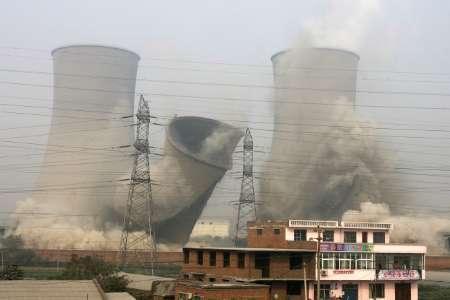U.N. Talks In Spain Seek To Salvage Climate Deal
Country: NORWAY
Author: Alister Doyle, Environment Correspondent

Cooling towers are demolished in an attempt to
save energy and reduce emissions, at a power plant in Xinxiang,
Henan province, October 28, 2009. The United States does not expect
to reach an agreement on climate change with China during President
Barack Ob
Photo: Donald Chan
OSLO - Climate negotiators from 175 nations meet in Spain next week for a final session to try to break deadlock between rich and poor and salvage a U.N. deal due in Copenhagen in December.
The November 2-6 talks in Barcelona of almost 4,000 delegates, led by senior government officials, will seek to end deep splits about sharing out curbs on greenhouse gases and ways to raise billions of dollars to help the poor tackle global warming.
In a step forward, British Prime Minister Gordon Brown said European Union leaders agreed on funds at a summit on Friday with three conditional offers for Copenhagen. He said poor nations need 100 billion euros ($148 billion) a year from 2020.
Brown told reporters in Brussels that EU states would pay their "fair share." "I think this is a breakthrough that takes us forward to Copenhagen," he said.
Most industrialized nations have not outlined offers.
All sides agree progress has been too slow since talks began in 2007, spurred by findings by the U.N. Climate Panel that world emissions would have to peak by 2015 to avoid the worst of desertification, floods, extinctions or rising seas.
"Time has almost run out," Yvo de Boer, head of the U.N. Climate Change Secretariat, told delegates in a video message. "In Barcelona, all nations must step back from self-interest and let common interest prevail."
The worst financial crisis since the 1930s has distracted attention from global warming and the United Nations and many countries say a legally binding treaty is impossible at the Copenhagen meeting from December 7-18.
The U.S. Senate is unlikely to agree legislation to cut U.S. emissions before Copenhagen, raising fears that other rich nations will be unwilling to promise deep cuts.
"The issue is 'can we agree on the core questions?'," said Michael Zammit Cutajar of Malta, chair of a group negotiating commitments by all nations. "I think we can."
HUGE PUZZLE
"It's a huge puzzle politically to get things done," said Bill Hare, of the Potsdam Institute for Climate Impact Research. He said there had been too much optimism that U.S. President Barack Obama would bring new momentum this year.
"There is a big risk that you end up with a woolly G8-type statement that doesn't take us anywhere," said Mark Kenber, of London based think-tank the Climate Group. The Group of Eight club of the world's leading industrialized nations usually releases non-binding statements of principle after its summits.
Developing nations such as China and India say that the developed countries must cut their emissions by at least 40 percent below 1990 levels by 2020 -- arguing they got rich by burning fossil fuels since the industrial revolution.
Offers on the table so far from the rich countries total cuts of about 11 to 15 percent. And developed nations say the poor must also do more by 2020 to slow their rising emissions -- China, the United States, Russia and India are the top emitters.
"It's crucially important that we keep ambitions high, to reach something we can consider 'the Copenhagen Deal'. We do not support any notion of postponing into 2010," said Kim Carstensen of the WWF environmental group.
De Boer wants Copenhagen to agree four key elements -- individual cuts in emissions for rich nations, actions by poor nations to slow their rising emissions, new finance and technology for developing nations and a system to oversee funds.
© Thomson Reuters 2009 All rights reserved
